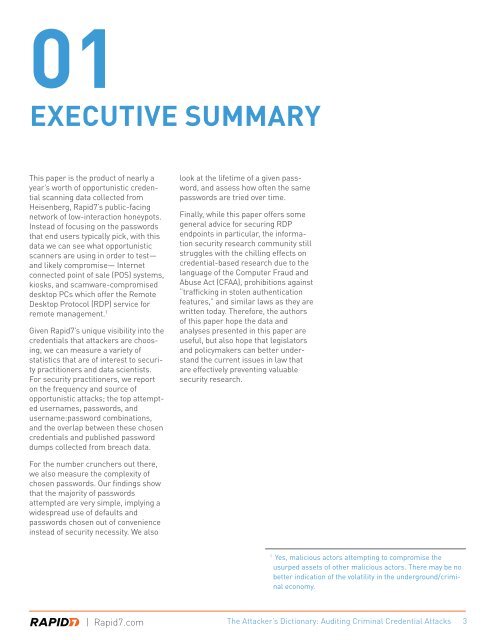The Attacker’s Dictionary
rapid7-research-the-attackers-dictionary
rapid7-research-the-attackers-dictionary
Create successful ePaper yourself
Turn your PDF publications into a flip-book with our unique Google optimized e-Paper software.
01<br />
EXECUTIVE SUMMARY<br />
This paper is the product of nearly a<br />
year’s worth of opportunistic credential<br />
scanning data collected from<br />
Heisenberg, Rapid7’s public-facing<br />
network of low-interaction honeypots.<br />
Instead of focusing on the passwords<br />
that end users typically pick, with this<br />
data we can see what opportunistic<br />
scanners are using in order to test—<br />
and likely compromise— Internet<br />
connected point of sale (POS) systems,<br />
kiosks, and scamware-compromised<br />
desktop PCs which offer the Remote<br />
Desktop Protocol (RDP) service for<br />
remote management. 1<br />
Given Rapid7’s unique visibility into the<br />
credentials that attackers are choosing,<br />
we can measure a variety of<br />
statistics that are of interest to security<br />
practitioners and data scientists.<br />
For security practitioners, we report<br />
on the frequency and source of<br />
opportunistic attacks; the top attempted<br />
usernames, passwords, and<br />
username:password combinations,<br />
and the overlap between these chosen<br />
credentials and published password<br />
dumps collected from breach data.<br />
look at the lifetime of a given password,<br />
and assess how often the same<br />
passwords are tried over time.<br />
Finally, while this paper offers some<br />
general advice for securing RDP<br />
endpoints in particular, the information<br />
security research community still<br />
struggles with the chilling effects on<br />
credential-based research due to the<br />
language of the Computer Fraud and<br />
Abuse Act (CFAA), prohibitions against<br />
“trafficking in stolen authentication<br />
features,” and similar laws as they are<br />
written today. <strong>The</strong>refore, the authors<br />
of this paper hope the data and<br />
analyses presented in this paper are<br />
useful, but also hope that legislators<br />
and policymakers can better understand<br />
the current issues in law that<br />
are effectively preventing valuable<br />
security research.<br />
For the number crunchers out there,<br />
we also measure the complexity of<br />
chosen passwords. Our findings show<br />
that the majority of passwords<br />
attempted are very simple, implying a<br />
widespread use of defaults and<br />
passwords chosen out of convenience<br />
instead of security necessity. We also<br />
1 <br />
Yes, malicious actors attempting to compromise the<br />
usurped assets of other malicious actors. <strong>The</strong>re may be no<br />
better indication of the volatility in the underground/criminal<br />
economy.<br />
| Rapid7.com <strong>The</strong> <strong>Attacker’s</strong> <strong>Dictionary</strong>: Auditing Criminal Credential Attacks 3


